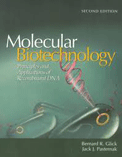


Author Name = Bernard R. Glick
Realeased On = Releases On 2009
Principles and Applications of Recombinant DNA, 4e cover the fundamental scientific principles and deals lengthily with the many industrial, agricultural, pharmaceutical, and biomedical application of recombinant DNA technology.Cover the claim of molecular biology to together basic and practical biotechnology research,reas of interest comprise the constancy and look of cloned gene products, cell transformation, gene cloning systems, after that generation sequencing, nanobiotechnology, molecular and cell biology mechanization.
Molecular Biotechnology publishes original study papers on the application of molecular biology to both basic and applied research in biotechnology. exacting areas of interest include the constancy and expression of cloned gene products, cell alteration, gene cloning systems and the production of recombinant proteins, protein purification and analysis, transgenic species, developmental biology, mutation analysis, the applications of DNA fingerprinting, RNA interference, and PCR technology, microarray technology, proteomics, mass spectrometry, bioinformatics, plant molecular biology, microbial genetics, gene probes and the diagnosis of disease, pharmaceuticals, therapeutic agents, vaccines, gene targeting, gene therapy, stem cell technology and tissue engineering, antisense technology, protein engineering and enzyme technology, monoclonal antibodies, glycobiology and glycomics, and agricultural biotechnology. The journal also presents evaluation articles on subjects in these area.
Cover the claim of molecular biology to together basic and practical biotechnology research

The National Institute of Molecular Biology and Biotechnology, also known as BIOTECH or NIMBB, is a research institute of the University of the Philippines. It is headquartered at UP Los Banos (BIOTECH-UPLB) and has branches in UP Diliman (NIMBB-Diliman/BIOTECH-Diliman), UP Manila (National Institutes of Health-IMBB/BIOTECH-UP Manila) and UP Visayas.
BIOTECH laboratories are accredited and recognized by Environmental Management Bureau, Department of Environment and Natural Resources, Bureau of Food and Drugs, Department of Health, and Bureau of Animal Industry.